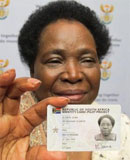
Top stories





Energy & MiningGlencore's Astron Energy gears up with new tanker amidst Sars dispute
Wendell Roelf 12 hours

More news

















Logistics & Transport
Uganda plans new rail link to Tanzania for mineral export boost











The smart card ID system will replace the current civic and immigration identity systems. The new system will enable government to digitally capture biometric and biographical details of all South Africans or foreign nationals, which will be stored in one integrated system.
"We are happy to announce that we are on track with plans to roll-out the smart ID card in 2013. Smart ID Card - watch it, it is coming!" enthused Apleni.
He also said the issue of duplicate IDs continued to receive the attention of the department to ensure the dignity of those affected by the problem.
With regard to rendering a service "that is efficient, accessible and corrupt free", the department continued to train its management.
About 98.3% of IDs were issued within 47days, amounting to 222 713 in the second quarter. About 95.9% passports that were processed manually were issued within 24 days, amounting to 98 316 in the period under review.
"With offices that have live capture capacity, 97.49% of passports were issued within 13 days. This amounts to 35 269 passports," said Apleni.
The department was aware of challenges relating to applications for permanent residence permits.
"The department took a decision to prioritise temporary residence permits, as this category of foreigners was at risk of being in the country illegally if their applications were not finalised timeously," Apleni said.
The department had begun to address permanent residence backlog with effect from August 2012.
In addressing this backlog, the department recognised its role in contributing to South Africa's economic development and national priorities as they relate to the attraction of critical skills.
As such, officials intended to address the backlog by facilitating the speedy adjudication of permanent residence applications from applicants with critical skills.
The department would prioritise applications for permanent residence permits from holders of "quota work permits and exceptional skills work permits" in line with the country's objective of attracting critical skills.
Once these applications were finalised, said Apleni, authorities would process other categories of permanent residence applications.
"Our projection is to finalise the backlog by the end of the current financial year."
SAnews.gov.za is a South African government news service, published by the Government Communication and Information System (GCIS). SAnews.gov.za (formerly BuaNews) was established to provide quick and easy access to articles and feature stories aimed at keeping the public informed about the implementation of government mandates.
Go to: http://www.sanews.gov.za